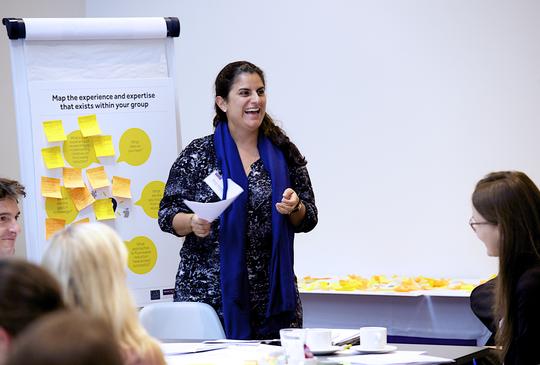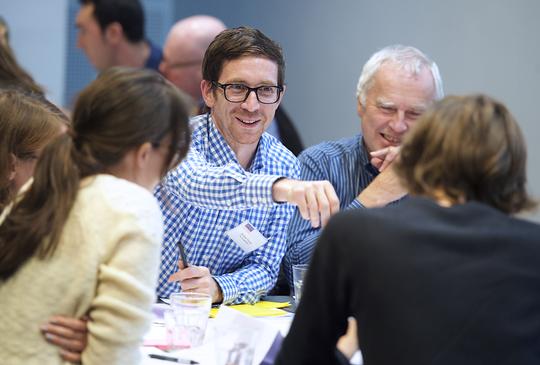
‘Food for Thought’: international multi-stakeholder workshop brings food waste experts to Manchester
Food waste has been high on the political agenda this year. In January the British Retail Consortium announced that the major supermarkets would begin regularly reporting on the amount of food wasted in their stores. In April the House of Lords Inquiry into EU food waste prevention published its findings, garnering widespread media coverage.
By September the Waste and Resources Action Programme’s (WRAP) ‘Love Food Hate Waste’ campaign had launched new initiatives across ten UK cities, including Greater Manchester. And food banks, largely supplied by supermarket surplus, were rarely out of the news as austerity bit across the UK, most recently with the publication of the all-party, Church of England-funded report ‘Feeding Britain'.
Consumers in the developed world waste nearly as much food as sub-Saharan Africa produces. At least one third of all food produced for consumption globally gets wasted – 1.3 billion tonnes annually.
The facts and figures are extraordinary. Consumers in the developed world waste nearly as much food as sub-Saharan Africa produces. At least one third of all food produced for consumption globally gets wasted – 1.3 billion tonnes annually. If food waste was a country it would have the third largest carbon footprint in the world, after the USA and China.
In the UK, we waste 15 million tonnes of food every year, with a cost to business of at least £5 billion. Annual food waste from UK households amounts to a staggering 13 billion “five a day” portions: at a time when the working poor are skipping meals to feed their kids. We're in the extraordinary position where, for some, food is too cheap to care about but for others it's too expensive to buy. That’s the bad news.
The good news is that unlike most environmental problems we’re actually addressing it. And the UK is leading the way. According to WRAP avoidable household food waste fell from 5.3m tonnes in 2007 to 4.2m tonnes in 2012. While about half of that can be attributed to belt tightening through the economic crisis, about half is due to successful initiatives. And unlike most environmental problems there’s relative consensus around it – at least for now.
The Food Waste ‘Coalition’
Research we’ve carried out at the University of Manchester’s Sustainable Consumption Institute, focusing on the issue of food waste at the interface between households and grocery retailers, has shown there is a dense network of inter-related stakeholders around the issue, with WRAP as central.
While with many sustainability issues we see a process of coercive pressure from campaigners and civil society, followed by a diffusion of innovations around the issue from the corporate world, food waste is different.
While with many sustainability issues we see a process of coercive pressure from campaigners and civil society, followed by a diffusion of innovations around the issue from the corporate world, food waste is different. Rather, a multi-stakeholder coalition has rapidly developed around the issue.
Interviews with 33 key stakeholders have shown a strong consensus that responsibility for the issue is distributed amongst multiple actors: households, retailers, producers and policymakers. There’s a recognition that there it is a systemic issue and that inter-relations between parts of the system are crucial.
For example, the way in which retailers might pass on the problem of food waste to households through their marketing and promotional practices. The importance of the role of retailers as agents for change is also widely shared.
‘Food for Thought’
The Sustainable Consumption Institute’s (SCI) ‘Food for Thought’ workshop sought to foster this network around food waste.
The workshop brought together over 40 key stakeholders, including representatives from: the UN Food and Agriculture Organisation, the UN Environment Programme, the World Resources Institute and the UK’s Food Standards Agency; policymakers from Defra, the Welsh Government, and delivery agency Zero Waste Scotland; third sector organisation such as Forum for the Future and Keep Britain Tidy (Wastewatch); representatives from ASDA, The Cooperative Group, Marks and Spencer, Morrisons, Tesco and industry body the IGD; and campaigners, consultants and academics from across the UK and Europe.
Dr. David Evans, principal investigator on the ESRC\SCI funded project, and facilitator Steve Connor of Creative Concern welcomed delegates to the Manchester Museum venue. WRAP researcher Dr. Tom Quested and Programme Manager Andrew Parry gave the opening keynote on the agency’s evidence base. Stakeholder interviews for the SCI project have demonstrated the centrality of WRAP for the emergence of a consensus around food waste in the UK.
The central themes of the workshop were the relationship between research and policy, and evidence and action. The innovative workshop design challenged participants to collaborate across different stakeholder constituencies—academia, policy, third sector and retail—to better understand the constraints and structures within which each operates.
The morning was spent working in groups, with delegates introducing themselves, mapping their expertise and experience, and reporting back to workshop as a whole. This formed the groundwork for the afternoon’s intensive group activity: thinking through the objectives, design, challenges and outputs of a mock research project, policy intervention or campaign on consumer food waste.
The six groups then fed back to the workshop as a whole. Policy interventions were proposed to: reduce red meat waste from households through ‘smart labelling’; and to both provide guidance for industry on optimised product shelf life and on creating infrastructure and outlets for use of food outside of its shelf life. The ‘Design a Campaign’ challenge was taken up to develop food skills of students to reduce food waste within the home. WRAP research has shown young people waste more than food than other age groups.
Three groups took up the ‘Research Project’ remit, offering ambitious designs to: understand how shopper diversity and different modes of provision (online, convenience stores etc.) affect food waste; understand young people’s food consumption practices; and understand how the imperatives of food waste and nutritional policy interact (and potentially conflict) in institutional settings such as schools and hospitals.
Dr Julian Parfitt (Anthesis Group), special advisor to the House of Lords Inquiry, gave the concluding keynote on ‘Closing the gap between policy and evidence gathering’. Julian was able to report on the House of Lord’s debate he attended just the day before, held in response to the Inquiry’s report. Issues were raised about the gap between policy and evidence gathering at EU level, with a lack of consistency across Europe, and tensions between ‘standard of evidence’ and ‘urgency of action’. Julian concluded on the need for closer linking of food waste, food security and food sustainability, and for policy and actions that support whole supply chain approaches.

What makes the food waste issue different?
Why has the consensus and coalition around food waste emerged so rapidly? We suggest there are four key enabling conditions. Firstly, the key stakeholders approach the issue through largely shared understandings of food poverty, food security, and climate change.
Secondly, there’s the stage in the ‘lifecycle’ of the wider issue of waste. WRAP’s public interventions, especially publishing credible figures on food waste, have been crucial. It’s meant that the stage of getting the specific issue of food waste on the agenda—often a lengthy process of campaigning—has been rapidly transcended by the stage of problem solving. As one of our NGO interviewees noted, the issue of food waste “happened to come along at the same time that households were becoming relatively mature in their understanding of the waste issue because of recycling—we just hadn’t thought about food.”
Thirdly, there’s the clear lack of a counter-constituency. Unlike, for example, genetic modification, it is not an issue where opposing interests support a counter-narrative.
Lastly, there’s something specific about food. As one respondent noted, “there’s something really fundamental about food that goes right to the human soul”. There’s a visceral sense that “food waste is morally repugnant”, as Baroness Scott, chair of the House of Lords Inquiry, put it.
Food waste draws upon an existing moral repertoire. One retailer noted, “our colleagues care about the issue, our suppliers care about the issue. And our customers clearly care about the issue”. It’s useful to contrast practices relating to food waste with those relating to energy—whilst energy is hidden and invisible, food is material and tangible. Whilst there are strong moral reactions to food waste, calling on this already existing repertoire of norms, promoting new norms for sustainability in relation to energy use is fraught with difficulty.
So, the potential for real and lasting change around food waste is exciting. The gains are enormous. Eliminating avoidable food waste in the UK would be the equivalent reduction in greenhouse gas emissions of taking one in four cars off the road. And according to the Institute of Mechanical Engineers tackling global food waste could meet the growth needed in global food production to feed the projected population of 2075 without substantial increase in land use.
The Households, Retailers and Food Waste Transitions project concludes next year and will be reporting its findings through a dissemination event and stakeholder report.
Perspectives essay: love food and hate waste
Contributed by Debbie Ellen and Lucy Danger
Contributor Profile
Dr. Daniel Welch is a Research Associate at the Sustainable Consumption Institute, University of Manchester, where he is currently researching the role of institutional actors in food waste prevention. He was previously with the Sustainable Practices Research Group, in a communications role and synthesising the policy implications of the SPRG’s research. His doctoral thesis, in Sociology, analysed the commercial field of sustainability communications.





